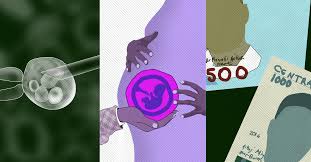![]()
If you’ve landed on this article page, you’re probably searching for a
good business idea—an idea that’s light on the pocket but heavy on
returns, promising both a fulfilling journey and potential profit.
|
How to make money as an Egg Donor in Nigeria
Egg donation is a process in which a fertile woman donates an
egg, or oocyte, to another woman to help her conceive. It is a
part of assisted reproductive technology, or ART.
The procedure typically involves a doctor removing an egg or
eggs from the donor, fertilizing them in a laboratory, and then
transferring the resulting embryos into the recipient’s uterus.
Doctors do this using an implantation procedure, such as in
vitro fertilization (IVF).
Sometimes, specialists at the facility may freeze some or all of
the embryos for later use or implantation in different women.
Egg donation frequently benefits women who cannot use their own
eggs for various reasons, including ovarian failure, avoiding
congenital anomalies in the fetus, or advanced age.
The donor will then take a series of fertility drugs that
stimulate the ovaries to produce several eggs at once. This is
known as hyperstimulation. Donors will need to self-administer
this medication by injecting it under their skin or into a
muscle.
Some women may experience mild side effects, such as bruising at
the injection site, mood swings, and tender breasts. In rare
cases, a woman may develop severe ovarian hyperstimulation
syndrome (OHSS). This occurs when too many eggs develop in the
ovaries. Women who develop OHSS may require hospitalization.
Donors do have a risk of pregnancy before the eggs are
retrieved, so it is a good idea to avoid intercourse or use a
barrier contraceptive, such as a condom.
Throughout the donation cycle, a donor will undergo frequent
blood tests and ultrasound examinations to monitor their
reactions to the medications.
During extraction: Shortly before the retrieval of the eggs, the
donor will receive a final injection in preparation for the
procedure.
The doctor will perform a transvaginal ovarian aspiration to
remove the eggs from the donor’s ovaries. They will insert an
ultrasound probe into the vagina and use a needle to remove the
egg from each follicle.
During the procedure, which lasts around 30 minutes, the doctor
might give the donor painkillers, sedatives, or an anesthetic.
As this is a minor procedure, a donor will not need to stay at
the clinic or hospital overnight.
After donation: Some women find they need several days of rest
to recover from the transvaginal ovarian aspiration. Others
return to normal activities the next day.
Generally, donors are between 21 and 35 yearsTrusted Source of
age. Women in this age group tend to respond better to fertility
drugs and often have a higher quality and quantity of eggs.
Donors should be free of infections, such as HIV and hepatitis
C. Also, they should not have a high risk of genetic diseases,
such as those who carry the cystic fibrosis gene.
Women may not be eligible to donate if they face a high risk of
exposure to HIV or other infections. Equally, an individual may
not be able to donate eggs if they cannot provide a detailed
family medical history.
Reputable egg donor programs include a thorough psychological
screening of all individuals involved.
Evaluating the donor’s mental health is vital to ensure the
health of any resulting children, and to be sure the donor is
making an informed decision before beginning the donation
process.
Egg donation can be expensive: Parents Via Egg Donation, a
global non-profit organization, estimate the cost of fresh egg
donation in the U.S. at $35,000–$50,000 for an exclusive fresh
cycle. This means that the recipients do not share eggs with
other women on the program. The cost of a shared donor egg cycle
begins at around $18,000.
A woman may choose to use frozen eggs from a donor bank. This
typically costs $16,000–$20,000 in the U.S., with much lower
rates available in Europe.
If you answer an advertisement, you may be interviewed over the
telephone, or be sent an application to fill out. Based on your
responses, the program may decide that you are unlikely to be
chosen, and you may not hear from them again. If the program
decides that you are likely to be chosen, you may be invited to
proceed with the selection process. Before you are accepted as
an egg donor, however, you will be required to undergo medical
and psychological screening.
Before you are screened, the egg donor program staff will
thoroughly describe the procedures and risks involved in
donation. That way, if you decide not to proceed, you can avoid
the screening process. In any case, do not give your written
agreement to become an egg donor before the screening process is
complete. After you
are screened, the results of your medical tests should be
discussed – whether or not you become a donor.
Clinics pay ₦100,000 – ₦120,000 for first-time donors. And by
your second donation, this amount goes up by ₦20,000 – ₦30,000.
The only caveat is that you must produce six eggs completely
before you get full payment. If not, you’ll get only half of
your payment. But that rarely happens. After all, you’d have
been going for scans and weekly checkups to monitor your
progress.
Being an egg donor is something you can do. The procedure is
relatively safe and the turnover time for making the money is
good. As long as you keep going to reputable clinics and
following the instructions of health professionals
Nigeria’s unemployment rate of 33.3 percent in 2020 – a number
that is steadily rising – plus its high inflation rate
negatively affects the economic mobility of many citizens.
Against this backdrop, the promise of money is a big incentive
for many young people to do things they would not ordinarily
consider.
But with the government-mandated minimum wage in Nigeria at
70,000 naira ($73) per month, and even the least well-paid egg
donation paying more than double that per round, many are
willing to accept the potential health risks.
The procedure for egg retrieval is usually completed within 30
minutes with the patient under sedation. A needle is passed
through the posterior vaginal wall into the ovaries under
ultrasound guidance. The mature follicles are then aspirated via
the needle into test tubes. This process is repeated for the
second ovary. The patient is given analgesics and antibiotics
afterwards and is put on bed rest to allow the sedation to wear
off.
Get our valuable Guide on how to be an Egg Donor in Nigeria. We
can even help you learn how to be an Egg donor. If you would
like to know how to donate Egg, or if you are interested in
finding a top Egg donor bank, contact us today to speak with our
dedicated fertility specialists.
|







